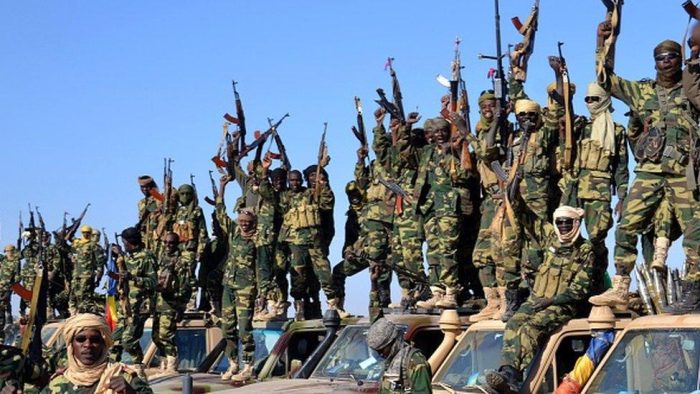Listen to the article
Nigerian Military Fought “Information War” Against Boko Haram, Says Former Army Spokesman
Nigeria’s battle against Boko Haram insurgents extended beyond physical confrontations to an equally challenging “information war,” according to former Nigerian Army spokesman, Brigadier General Sani Usman (retd.).
Speaking at an event marking the 35th anniversary of the Federal Capital Territory chapter of the Nigerian Institute of Public Relations (NIPR) on Saturday, Usman revealed that the military had to completely restructure its communication approach to counter the insurgents’ sophisticated propaganda machine.
“We were in the middle of an information war that tested our credibility, speed, and strategic communication under pressure,” Usman said. “We fought two wars simultaneously—one was a physical war against insurgents on the ground and the other, an information war against their digital propaganda and global misinformation network.”
The retired general highlighted 2014 as a particularly challenging period when public trust in official military statements had eroded significantly. During this time, many Nigerians found themselves caught between conflicting narratives, unsure whether to believe government sources or the insurgents.
“In 2014, we had a situation where the average Nigerian did not even know whom to believe, whether the insurgents or the government,” he explained. “And this was because, sincerely speaking, when the insurgents threatened they would do something, they always went ahead to do it. So, that was the situation I inherited.”
The year 2014 marked a pivotal moment in Nigeria’s counterinsurgency efforts. Under the leadership of Abubakar Shekau, Boko Haram captured global attention with the abduction of nearly 300 schoolgirls from Chibok, Borno State—an incident that sparked the international #BringBackOurGirls campaign and intensified scrutiny of Nigeria’s security operations.
Usman detailed how Boko Haram strategically exploited digital platforms to advance their cause. “They were all over social media platforms, particularly YouTube, where they exploited the Internet and emerging technologies to shape narratives, build followers, whip up sentiments, and, in fact, instil fear in Nigerians,” he said.
The security environment was so tense that, according to Usman, merely mentioning “Boko Haram” or its leader Shekau in public could potentially make individuals targets of the group. This atmosphere of fear further complicated the military’s efforts to communicate effectively with the public.
In response to these challenges, the Nigerian military adopted a more transparent and proactive communication strategy aimed at reclaiming narrative control—a significant shift from its previously reactive approach to public information management.
Now in its 15th year, the Boko Haram insurgency has evolved significantly since its early days. Following Shekau’s reported death by suicide in 2021 during a confrontation with rival militants, the Islamic State West Africa Province (ISWAP) emerged as the dominant jihadist faction in northeastern Nigeria.
The humanitarian toll of the conflict has been devastating across the Lake Chad basin region, which encompasses parts of Nigeria, Niger, Chad, and Cameroon. More than two million people have been displaced, and thousands have lost their lives due to the violence, with rival factions continuing to battle for territory and influence.
Security analysts note that while military operations have degraded Boko Haram’s capabilities compared to its 2014-2015 peak, when it controlled territory the size of Belgium, the group and its offshoots remain resilient. The ongoing insurgency continues to challenge Nigeria’s security forces and destabilize communities in the country’s northeast.
At the NIPR anniversary event, Chairman Stanley Ogadigo praised the institute’s three and a half decades of “impactful living” and its dedication to upholding professional standards among public relations practitioners—work that takes on special significance in an era where information warfare has become a critical component of national security.
Fact Checker
Verify the accuracy of this article using The Disinformation Commission analysis and real-time sources.




8 Comments
This article underscores the importance of strong public relations and crisis communication capabilities within the military. Developing a robust information strategy is essential for maintaining public trust and countering adversary narratives.
The military’s experience highlights the evolving nature of modern warfare, where information and communication can be as important as physical operations. Adapting communication approaches is key to staying ahead of adversaries.
Agreed. Information warfare is a crucial component of contemporary conflicts, and militaries must be nimble and innovative in their strategic communication to effectively counter misinformation.
The Nigerian military’s experience highlights the need for continued investment in strategic communication capabilities to stay ahead of evolving threats. Effective information management is crucial for success in today’s complex security landscape.
It’s concerning to hear about the erosion of public trust in the military’s statements during the height of the Boko Haram conflict. Rebuilding credibility in the face of disinformation must have been a significant challenge.
Absolutely. Restoring credibility when public trust has been compromised is an immense undertaking, especially when dealing with the complex information environment of modern warfare.
Interesting to hear how the Nigerian military had to adapt its communication strategy to counter Boko Haram’s sophisticated propaganda. Managing the information war alongside the physical conflict must have been an immense challenge.
Absolutely. Maintaining credibility and public trust in the face of conflicting narratives is critical, especially when dealing with extremist groups leveraging digital platforms.